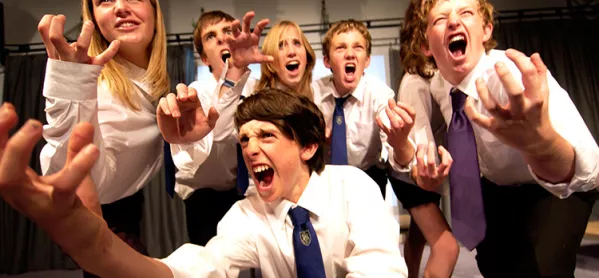
- Home
- ‘Drama is the perfect place to explore LGBT texts’
‘Drama is the perfect place to explore LGBT texts’

I’m a drama teacher and I’ve got a confession: I use the same play texts over and over again. It’s not that they aren’t great texts - I mean, the classics are the classics for a reason, some plays are written with young people in mind, some work really well with a large mixed cast and some just really suit the context.
I’ve been teaching for 10 years in Yorkshire and we’ve always leaned heavily on John Godber and his quick-fire comedies and stereotype characters. I know teachers whose “go-to” is usually Blood Brothers or DNA - good plays about young people with enough balance of comedy and pathos to demonstrate an actor’s range.
But the thing is, drama in schools isn’t necessarily about training young actors - that’s the job of the drama schools. No, in education drama is all about themes and process and styles and stories and tension (of course, there’s always room for technique).
Down the road from me, while still a teacher himself, John Godber wrote Teechers (1987); and it is often used by practitioners at GCSE. Some of the references might be a bit dated, but the issues addressed - low priority of arts in schools, cuts in education funding, teacher stress and student apathy - are actually as relevant as ever.
But what are the big discussion points of 2019? Brexit? Far-right ideology? Snowflake attitude? Migration? The environment? LGBT rights and awareness? Vegan sausage rolls? #Me-too? Are there play texts to look at these? And should we use them in the classroom?
Fishing around on drama teacher forums, the same play texts pop up, Stags and Hens, Blue Remembered Hills, My Mother Said I Never Should, 4.48 Psychosis, DNA, Blackout.
Use drama to highlight real-world issues
They do address big topics of the times, from working-class aspirations to sexting, to youth offending, peer pressure, men and women, mental health and more. But, as drama teachers, shouldn’t we keep our finger on the pulse and our play texts up to date? DNA on the GCSE list is 10 years old.
A quick cast around online and certain things do jump out - more than I had expected.
On Tes, I read about a production of Macbeth by NT Youth Theatre which cast a female Macbeth, among other innovations. There are lots of interesting points in there and some good signposts for teachers, too. Historically, Shakespeare has always been a good starting point for flipping gender assumptions on their head. Not least with all the mistaken identity storylines and men as women tradition. This would be so simple to work in our classrooms. And it’s not new news: Panto Dame, anyone?
Looking locally, I find that Leeds Playhouse cast a female Hamlet this season, and is running a programme celebrating LGBT History Month. As part of this, it is also staging A Rainbow of Stories by its youth theatre, which promises to tell us the stories of a character with “two Mums” and of a “king marrying a king”. This theatre also has a decent track record in premiering work for young people that brings contemporary LGBT issues to the fore; for example, Girls Like That, Pronoun and Zoetrope.
For those a little further south, you can watch Call me Vicky at the Redbridge Drama Centre. A true story about transgender, it has huge potential for educating students and sparking discussion about one of, arguably, the most important issues in our society currently.
Exploring further, I sign on to a workshop session with the Donmar Warehouse at Theatre Royal Wakefield centred around a several years-long project which has seen the London theatre company produce three of Shakespeare’s plays with an all-female cast. I am reminded of famous examples of this such Glenda Jackson as King Lear, Maxine Peake as Hamlet.
Right away we have an interesting dynamic and talking point.
It seems to me a starting point for teachers wanting to explore. Is it OK to cast female actors in traditionally male roles? This is easily something we can experiment with in the classroom.
Clearly, there is a wave of work in this area - there’s little excuse to not incorporate these themes in our own lessons and productions.
As a teacher, I think it’s my duty to put the most contemporary issues and recent thinking in front of our young people to let them make up their own mind on what’s happening in the world.
Do we need to crowbar LGBT plays and issues and themes into lessons? No. Are we forcing a certain agenda on to our young people? No. Will all classes be ready for this kind of work? No.
Do we have an obligation to safely expose our drama students to the most up-to-date writing and support them to study work that pushes boundaries? Yes. Dig in and I’m sure you’ll find something for everyone.
Paul Bateson is a drama teacher in Yorkshire
Register with Tes and you can read five free articles every month, plus you'll have access to our range of award-winning newsletters.
Keep reading for just £4.90 per month
You've reached your limit of free articles this month. Subscribe for £4.90 per month for three months and get:
- Unlimited access to all Tes magazine content
- Exclusive subscriber-only stories
- Award-winning email newsletters
You've reached your limit of free articles this month. Subscribe for £4.90 per month for three months and get:
- Unlimited access to all Tes magazine content
- Exclusive subscriber-only stories
- Award-winning email newsletters